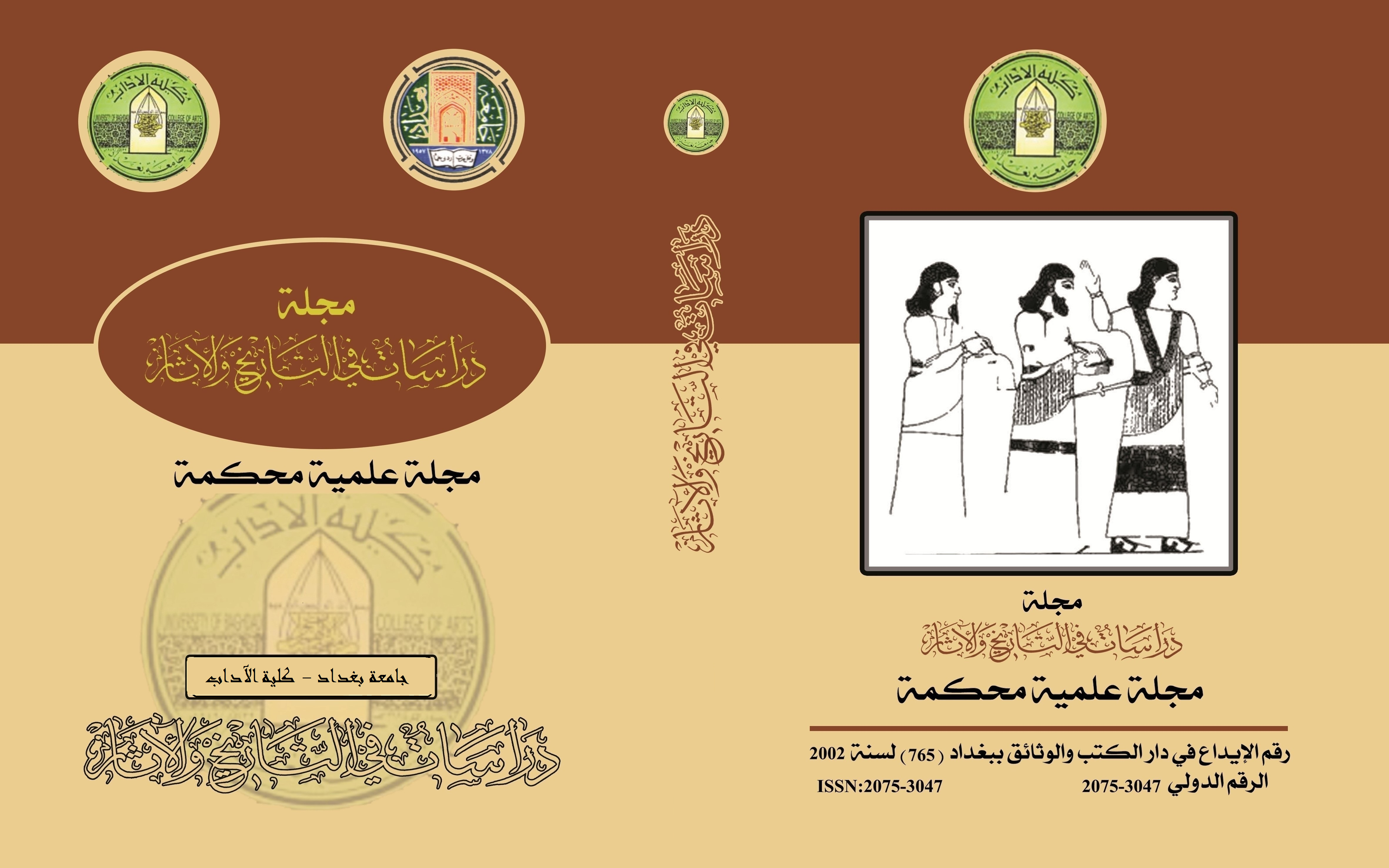موقف ريبيكا فيلتون من قضايا المرأة في الولايات المتحدة الأمريكية
DOI:
https://doi.org/10.65074/scv9zk06الكلمات المفتاحية:
ريبيكا فيلتون ، المرأة ، الولايات المتحدة الامريكية ، جورجيا ، مجلس الشيوخ.الملخص
يدرس البحث "موقف ريبيكا فيلتون من قضايا المرأة في الولايات المتحدة الأمريكية"، موقف احدى الامريكيات اللاتي انحدرن من المجتمع الجنوبي المحافظ من قضايا المرأة على مختلف الصعد ، ولما من المنطق ان يكون موقف النسوة عامة مؤيداً وداعماً لحقوقهن ولإسهامهن في جميع مناحي الحياة ، إلا أن ذلك لم يكن قاعدة مطلقة فهنالك من ميزن في المطالبة بالحقوق ما بين النسوة البيض والسود في ظل التمييز العنصري الذي ساد المجتمعات الجنوبية ، ومن بينهن ريبيكا فيلتون التي وقفت مناصرة لحقوق النسوة البيض من أبناء جلدتها في التعليم والملكية والمشاركة في صنع القرار السياسي حتى انها كرُمت لجهودها في ذلك المجال بتعيينها اول امرأة تشغل عضوية مجلس الشيوخ الأمريكي ، فيما اهملت المطالبة بحقوق النسوة السوداوات، و ذلك لا يعني اسدال الستار عن مواقفها وادوارها في الدفاع عن حقوق المرأة إذا ما أخذنا بنظر الاعتبار انها ناضلت لأجلها في ظل مجتمع جنوبي فلاحي لا يرى للمرأة مكانة سوى منزل زوجها ولا وظيفة سوى رعاية ابناءها .
المراجع
- مايكل كوربت، و جوليا ميتشل كوربت. (2006). الدين والسياسة في الولايات المتحدة الامريكية (المجلد ط3). (عصام فايز، و آخرون، المترجمون) القاهرة: مكتبة الشروق الدولية.
- Adams, K. H. (2019). Claiming Her Place in Gongress Women From American Political Families as Legislators . North Carolina: Mcfarland & Company Inc . Publishers .
- Brearley, M. E. (2010). The Politics of Persuasion : The Language and Limits of Gender Reform in the Career of Rebecca Latimer Felton. Masters of Arts. University of Georgia.
- Byrd, R. C. (1988). The Senate 1789-1989 :Addresses on the History of the United States Senate (Vol.2 ed.). Washington: U.S. Government Printing Office.
- Cooper, W. J., & Others. (2017). The American South A history : Volume II From Reconstruction to the Present. USA: Rowman & Littlefield.
- Dray, P. (2002). At the hands of persons Unknown : The lynching of black American. NewYork: The Modern Library.
- Eisenstark, R., & Friedenthal, L. (2010). Key Concepts in American History : Progressivism. (J. L. Weber, Ed.) New York: DWJ books LLC.
- Felton, M. W. (1911). My Memoirs of Georgia Politics . Atlanta: The Index Printing Company.
- Felton, R. L. (1919). Country Life in Georgia in the Day of My Youth Also Addresses Before Georgia Legislature Women's Clubs Women's Organizations and Other Noted Occasions . Atlanta : Index Printing Company .
- Felton, R. L. (1930). The Romantic Story of Georgia's Women. USA: The Atlanta Georgian & Sunday American.
- Floyd, J. B. (1946). Rebecca Latimer Felton : Champion of Women's Rights. The Georgia Historical Quarterly, No.2(Vol.30).
- Floyd, J. B. (1946, March). Rebecca Latimer Felton :Political Independent. The Georgia Historical Quarterly, No.1.
- Friedman, J. (2017). The Enclosed Garden Women and Community in the Evangelical South 1830-1900. North Carolina: University of North Carolina Press .
- Haley, s. (2016). No Mercy Here : Gender , Punishment and the Making of Jim Crow Modernity. The University of North Carolina Press.
- Helms, A. (2013). Poor Forsaken Colored Girls : Rebecca Latimer Felton (White Supermacy and Prison Reform. Master of arts. (C. o. Sciences, Ed.) Chicago: DePaul University.
- Ingalls, G. L., & Others. (1997, November). Fifty Years of Political Change in the South: Electing African Americans and Women to Public Office. Southeastern Geographer, Vol.37 ( No. 2 ).
- Knight, L. L. (1917). A Standard History of Georgia and Georgians . New York: The Lewis Publishing Company.
- Langston, D. (2002). A to Z of American Women Leaders and Activists . New York .
- Martin, S. H. (2016). Georgia’s Remarkable Woman:Daughters Wives Sisters and Mothers Who Shaped History (Vol. Second Edition). Rowman and Littlefield.
- Ritchie, D. A. (2006). Three Congress of the United State A Student Companion (Vol. Third Edition). New York : Oxford University Press.
- Smangs, M. (2020, November). Race Gender and the Rape-Lynching Nexus in the U.S. South 1881-1930. Social Problems, N.4.
- Stefanek, J. C. (2021). The Radicalism of Rebecca Felton : Reforming Southern Masculinty and Creating and Destroying History : Butte, Montana's Mode City Program 1968-1975. degree of Master of Arts in History. Missoula: The University of Montana.
- Talmadge, J. E. (1955, Spring). Rebecca Latimer Feton: Georgian. The Georgia Review, No.1.
- Taylor, A. E. (1942, December). The Abolition of the Convict Lease System in Georgia. The Georgia Historical Quarterly, Vol.26(No.3).
- Wheeler, M. S. (1993). New Women of the New South : The Leaders of the Woman Suffrage Movement in the Southern States . New York: Oxford University Press.
- Whites, L. A. (1992, Summer). Rebecca Latimer Feton and the Wife's Farm: The Class and Racial Politics of Gender Reform. The Georgia Historical Quarterly, No.2.
- Williamson, J. (1984). The Crucible of Race: Black-White Relations in the American South Since Emancipation. New York: Oxford University Press.
التنزيلات
منشور
إصدار
القسم
الرخصة

هذا العمل مرخص بموجب Creative Commons Attribution 4.0 International License.
:حقوق الطبع والنشر والترخيص
بالنسبة لجميع البحوث المنشورة في مجلة دراسات في التاريخ والآثار، يحتفظ الباحثون بحقوق النشر. يتم ترخيص البحوث بموجب ترخيص Creative Commons CC BY 4.0 المفتوح ، مما يعني أنه يجوز لأي شخص تنزيل البحث وقراءته مجانًا. بالإضافة إلى ذلك ، يجوز إعادة استخدام البحث واقتباسه شريطة أن يتم الاستشهاد المصدر المنشور الأصلي. تتيح هذه الشروط الاستخدام الأقصى لعمل الباحث وعرضه.
:إعادة إنتاج البحوث المنشورة من الناشرين الآخرين
من الضروري للغاية أن يحصل الباحثون على إذن لإعادة إنتاج أي بحث منشورة (أشكال أو مخططات أو جداول أو أي مقتطفات من نص) لا يدخل في نطاق الملكية العامة أو لا يملكون حقوق نشرها. يجب أن يطلب الباحثون إذنًا من مؤلف حقوق النشر (عادة ما يكون الناشر).
يطلب الإذن في الحالات التالية:
بحوثك الخاصة المنشورة من قِبل ناشرين آخرين ولم تحتفظ بحقوق النشر الخاصة بها.
مقتطفات كبيرة من بحوث أي شخص أو سلسلة من البحوث المنشورة.
استخدم الجداول والرسوم البيانية والمخططات والمخططات والأعمال الفنية إذا لم يتم التعديل عليها.
الصور الفوتوغرافية التي لا تملك حقوق لنشرها.
لا يطلب الإذن في الحالات التالية:
إعادة بناء الجدول الخاص بك مع البيانات المنشورة بالفعل في مكان آخر. يرجى ملاحظة أنه في هذه الحالة يجب عليك ذكر مصدر البيانات في شكل "بيانات من ..." أو "مقتبس من ...".
تعتبر عروض الأسعار القصيرة معقولة الاستخدام العادل ، وبالتالي لا تتطلب إذنًا.
الرسوم البيانية ، الرسوم البيانية ، المخططات ، الأعمال الفنية التي أعاد الباحث رسمها بالكامل والتي تم تغييرها بشكل ملحوظ إلى درجة لا تتطلب الاعتراف.
الحصول على إذن
لتجنب التأخير غير الضروري في عملية النشر ، يجب أن تبدأ في الحصول على أذونات في أقرب وقت ممكن. لا يمكن لمجلة الآداب نشر بحث مقتبس من منشورات أخرى دون إذن.
قد يمنحك مالك حقوق الطبع والنشر تعليمات بشأن شكل الإقرار الواجب اتباعه لتوثيق عمله ؛ بخلاف ذلك ، اتبع النمط: "مستنسخ بإذن من [المؤلف] ، [كتاب / المجلة] ؛ نشره [الناشر] ، [السنة]." في نهاية شرح الجدول ، الشكل أو المخطط.



















